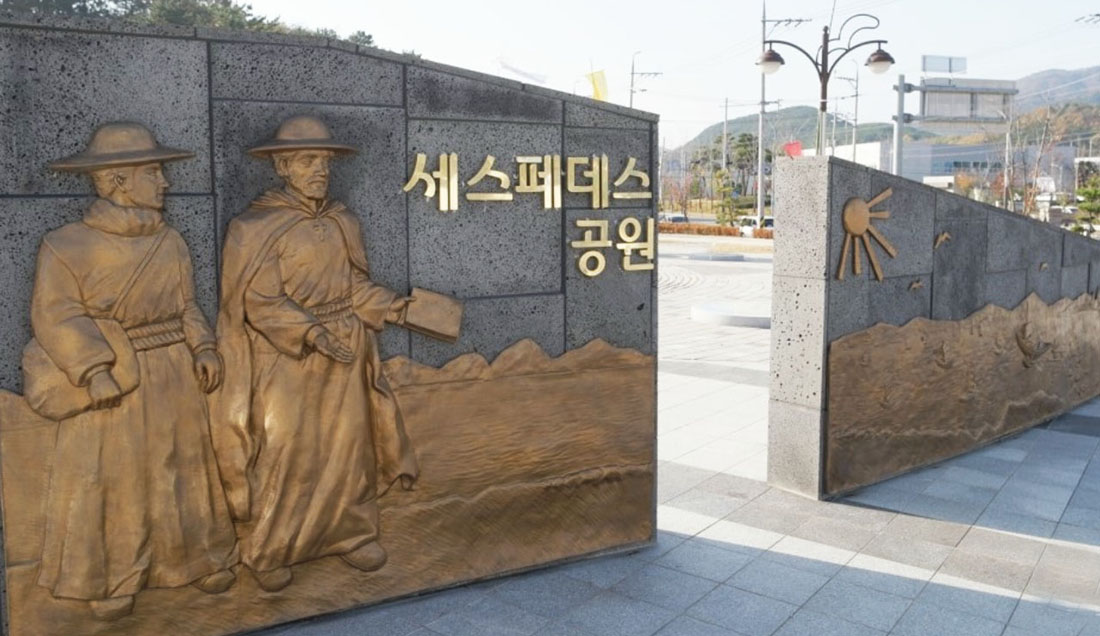
Gregorio de Cespedes, Collaborator of Intangible Combat Power
Gregorio de Cespedes(1551–1611), a Roman Catholic priest of Spanish origin who was active in Japan, was a collaborator (附逆者) who enhanced intangible combat power for Catholic believers among the Japanese forces fighting against Chosun(Korea) during the Imjin War(1592–1598).
For about a year during the Imjin War, he traveled between Wungcheon Fortress, Gijang Fortress, and Gupo Fortress at night, sprinkling holy water on Roman Catholic Japanese soldiers, hearing confessions, conducting masses, and teaching Roman Catholic doctrine.
The local government of Changwon City in South Korea created the Cespedes Memorial Park at a significant cost. It was, in fact, established to commemorate the ancestors who were wronged to death. Furthermore, they created a park to commemorate the collaborator who enhanced the intangible combat power of the Japanese invaders. It is truly a contradiction and stirs up anger.
In the military, power is divided into tangible and intangible combat power. Tangible combat power has a clear form. Based on these two powers, the military considers entities with value. For example, military equipment is tangible combat power. On the other hand, intangible combat power is a tremendous force with no physical form but clear value. In military terms, intangible combat power is also called spiritual power.
In military science, intangible combat power is considered more potent than tangible. Tangible combat power is additive, while intangible combat power is multiplicative.
Intangible combat power is the power of the mind. Historically, even though it lagged in scale, armies with strong intangible combat power have often achieved victory. The example of the Israeli Defense Forces winning several times in the prolonged "Middle East conflicts" can be cited.
Spiritual education is the foundation of intangible combat power. Religion, predominantly Christian faith, is a potent form of intangible combat power. The military is a place closest to the crossroads of life and death, always preparing for wars that determine life and death.
Christian religious activities on the battlefield are the most effective way to enhance intangible combat power. Providing comfort to the human "soul" on the battlefield, reviving it, and instilling faith that offers hope for the future is a powerful form of intangible combat power.
Soldiers with intangible combat power are much more robust than those without it. Spiritual education regarding life, death, salvation, and more is more effective than tangible combat power. Religion, particularly Christianity, is an intangible combat power that delves deeply into the human soul.
Countries like the United States and Europe, traditionally possessing advanced military forces, emphasize the importance of intangible combat power based on religion, specifically Christianity. They regularly strengthen religious-Christian spiritual education. Among U.S. military personnel, there is a widespread belief that "there are no atheists in foxholes." If intangible combat power based on Christianity is weakened, it becomes difficult to achieve victory in war.
Cespedes engaged in activities that enhanced intangible combat power based on religion among the Roman Catholic soldiers of the Japanese invaders. These Japanese invaders brutally massacred Koreans in the Battle of Jinju Fortress. Cespedes' efforts contributed to the enhancement of intangible combat power.
The local government of Changwon City in South Korea established a memorial park for the collaborator who strengthened the intangible combat power of the Japanese invaders.
Behind this is Professor Park Cheol, the former president of Foreign Language University and a Roman Catholic Church member. His research paper submitted for his doctoral degree at Madrid University designates Cespedes as the first European to visit Chosun (Korea). Park Cheol does not shy away from hagiography-style historical distortions.
Cespedes did not visit "Choson." He did not meet Koreans in Busan and Gyeongnam during the war against the Japanese invaders. He did not preach to Koreans. Chosun did not invite him. Chosun did not grant him a visa. Chosun did not provide him with travel guidance. Choson did not offer meals. Chosun did not welcome him.
Cespedes visited the war base of the Japanese invaders. Cespedes was a collaborator who provided intangible combat power to the Japanese invaders. Changwon City should promptly consider demolishing the Cespedes Memorial Park.
Doug Choi, Ph.D., the president of Peniel Theological Seminary, Busan, Korea. Choi is the author of KOREAN CHRISTIANITY(2010).
 Brave Iranian women Refused Hijab
Brave Iranian women Refused Hijab
 The French Revolution and the American Revolution
The French Revolution and the American Revolution

















